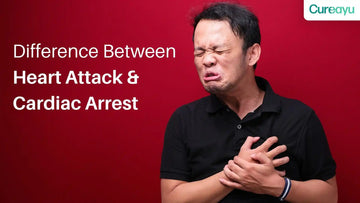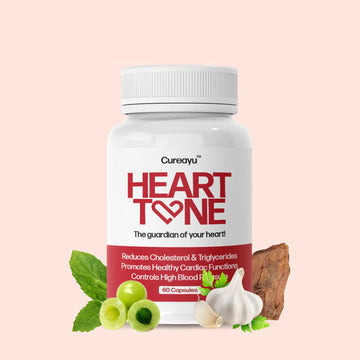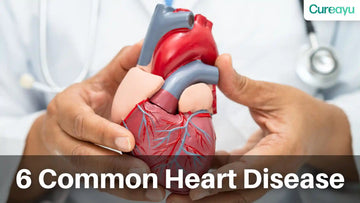In a world where heart disease remains a leading cause of death, understanding the differences between heart attack and cardiac arrest is crucial. Despite often being used interchangeably, these two conditions are fundamentally different in terms of causes, symptoms, and necessary interventions. Educating yourself about these differences can not only prepare you to act swiftly in emergencies but also possibly save lives.
Heart attack, medically known as myocardial infarction, and cardiac arrest are both serious, life-threatening conditions, but they target different parts of the circulatory system and require distinct approaches for management and treatment. This blog aims to delve deep into what sets these conditions apart, highlighting their unique characteristics and critical action points.
Also Read: How Smoking Affects Heart Health and Steps to Prevent Heart Disease
What Is a Heart Attack?
A heart attack occurs when the blood flow to a part of the heart is blocked for a sufficient duration to cause damage or death to the heart muscle. This blockage is usually caused by a buildup of fat, cholesterol, and other substances, which form a plaque in the coronary arteries. When the plaque ruptures, it forms a clot that obstructs the blood flow.
Symptoms of a heart attack can vary but generally include chest pain or discomfort that may radiate to the shoulders, arms, neck, or jaw. Other symptoms can include shortness of breath, nausea, vomiting, cold sweats, and lightheadedness. It’s important to remember that not everyone experiencing a heart attack will show the same symptoms, and some may have slightly different manifestations.
What Is Cardiac Arrest?
Cardiac arrest, on the other hand, occurs when the heart suddenly stops beating effectively, causing an immediate stop in blood flow to the brain, lungs, and other vital organs. This can happen suddenly and without warning. Cardiac arrest is primarily an electrical problem where the heart's electrical system malfunctions, leading to arrhythmias or irregular heartbeats.
The most common form of arrhythmia leading to cardiac arrest is ventricular fibrillation, a rapid and erratic electrical impulse that causes the heart to quiver uselessly instead of pumping blood. Symptoms of cardiac arrest are immediate and severe, including sudden collapse, no pulse, no breathing, and loss of consciousness. It’s critical to initiate CPR and use an automated external defibrillator (AED) as soon as possible to improve survival chances.
Also Read: A Comprehensive Guide on How to Prevent Heart Disease
Cardiac Arrest vs. Heart Attack
Here's a detailed comparison of heart attack and cardiac arrest based on various aspects:
Causes:
- Heart Attack: Caused by blockages in the coronary arteries due to plaque buildup, leading to restricted blood flow to the heart muscle.
- Cardiac Arrest: Resulting from a malfunction in the heart's electrical system, often triggered by arrhythmias such as ventricular fibrillation or severe bradycardia.
Symptoms:
- Heart Attack: Chest pain or discomfort, shortness of breath, nausea, vomiting, cold sweats, and pain radiating to the shoulders, arms, neck, or jaw.
- Cardiac Arrest: Sudden collapse, no pulse, no breathing, and loss of consciousness. There might be prior symptoms that indicate an impending cardiac arrest, such as fainting or dizziness, but often it strikes without warning.
Complications:
- Heart Attack: Can lead to heart failure, arrhythmias, cardiac arrest, and other heart-related issues if not immediately treated. Ongoing complications may include reduced heart function and chronic pain.
- Cardiac Arrest: Immediate brain damage and death if not treated promptly with CPR and defibrillation. Survivors may experience neurological deficits and require long-term medical care.
Treatment:
- Heart Attack: Treatment involves medication such as blood thinners, antiplatelet drugs, and pain relief. Medical procedures might include angioplasty or surgery to restore blood flow. Lifestyle changes and cardiac rehabilitation are necessary for recovery.
- Cardiac Arrest: Immediate intervention with cardiopulmonary resuscitation (CPR) and defibrillation is essential. Long-term solutions may include implantable cardioverter-defibrillators (ICDs) or medications to manage arrhythmias and prevent recurrence.
Prevention:
- Heart Attack: Prevention includes managing risk factors such as high blood pressure, high cholesterol, obesity, smoking, and sedentary lifestyle. Regular exercise, a balanced diet, and medications to control heart disease risks are vital.
- Cardiac Arrest: Prevention focuses on monitoring and managing heart disease and arrhythmias. Regular check-ups, avoiding recreational drugs, and adhering to prescribed treatments can help mitigate the risk.
Demographics:
- Heart Attack: More common in older adults, particularly men over the age of 45 and women over the age of 55. Family history and lifestyle factors significantly contribute.
- Cardiac Arrest: Can occur at any age but is more common in people with a history of heart disease, including those with previous heart attacks, cardiomyopathies, or inherited conditions affecting the heart's electrical system.
Which One Is More Dangerous: Heart Attack or Cardiac Arrest?
Nature of Onset:
Heart Attack: A heart attack, or myocardial infarction, occurs when blood flow to a part of the heart is blocked for a long enough time that part of the heart muscle is damaged or dies. This condition usually develops over time as the coronary arteries become narrowed by plaque buildup, a process known as atherosclerosis. Symptoms like chest pain, shortness of breath, and other warning signs can manifest for hours, days, or even weeks before the attack reaches its peak, providing a critical window for medical intervention.
Cardiac Arrest: Cardiac arrest happens suddenly and abruptly. It is due to an electrical malfunction in the heart causing an irregular heartbeat (arrhythmia). This disrupts the heart’s ability to pump blood, leading to a cessation of blood flow to the brain and other vital organs. A person experiencing cardiac arrest will collapse, lose consciousness, and display no pulse within seconds. Without immediate treatment, brain damage can occur within 4 to 6 minutes, and death may follow within 10 minutes.
Immediate Danger:
Heart Attack: While heart attacks are extremely serious and can lead to severe complications or even evolve into cardiac arrest, the potential for a gradual onset means that many individuals have a chance to seek emergency medical care. Treatment can involve medications like thrombolytics to dissolve the blockage and surgical procedures such as angioplasty or coronary artery bypass grafting (CABG) to restore adequate blood flow to the heart.
Cardiac Arrest: The immediate treatment for cardiac arrest is cardiopulmonary resuscitation (CPR) and defibrillation to restore a normal heart rhythm. Because cardiac arrest results in the heart's complete failure to pump blood, every second without these interventions dramatically decreases the chances of survival. The survival rate outside of a hospital setting is very low and depends on how quickly CPR and defibrillation are administered.
Survivability and Outcomes:
Heart Attack: Many people survive heart attacks, especially if they receive prompt treatment. Post-heart attack, patients require lifestyle changes and possibly long-term medication to manage risk factors and prevent future incidents. Cardiac rehabilitation programs further support recovery.
Cardiac Arrest: The survival rate for out-of-hospital cardiac arrest is significantly lower than for heart attacks. Immediate response, including the use of an automated external defibrillator (AED) and high-quality CPR, can save lives. Survivors of cardiac arrest often continue to face risks of neurological damage due to the lack of oxygen during the event, and strategies to avoid recurrent episodes, such as implanted defibrillators, may be necessary.
Secondary Complications:
Heart Attack: If untreated or not treated promptly, heart attacks can lead to serious complications such as heart failure, arrhythmias, or even cardiac arrest. However, with timely intervention, many of these risks can be mitigated.
Cardiac Arrest: Given its rapid progression, untreated cardiac arrest is almost uniformly fatal. Even with successful resuscitation, patients may suffer from anoxic brain injury—a type of neurological damage caused by prolonged lack of oxygen.
Also Read: High Blood Pressure Symptoms: Recognizing Early Signs to Protect Your Health
Conclusion
Understanding the differences between heart attack and cardiac arrest is vital for anyone who wishes to be prepared for potential medical emergencies. A heart attack involves a blockage in the coronary arteries and presents with symptoms like chest pain and shortness of breath, requiring prompt medical attention. Cardiac arrest involves an electrical malfunction that stops the heart from beating effectively, necessitating immediate CPR and defibrillation.
Both conditions underline the importance of knowing lifesaving techniques such as CPR and how to use an AED. With heart disease being prevalent, it is essential for communities to be educated and equipped to handle such emergencies. By being informed, we can contribute to timely interventions and potentially save lives, underscoring the critical need for continuous awareness and education on heart health.












